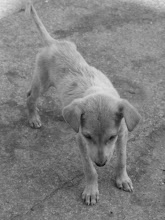There we were, in one of Corbett National Park's most famous chaurs, or grasslands, while our Gypsy driver pointed out a Horned Owl amid one of the branches. Along came another Gypsy, its denizens a bunch of young men from the City. Seeing us stop, they asked what could we see. We said, an Owl.
"उल्लू की माँ चोदो. हमें शेर देखना हैं."
And in one instance, my vision of a human world co-existing with the natural world disappeared.
Can man, as a species, truly recognize the importance of every species in a ecosystem? Given that everyone goes to Corbett to see a tiger (we did too), does that fact really diminish all other species' importance within that park? What is indeed, the difference between a tiger and an owl? Both cannot live in harmony with humans, and both are equally vital as is the Chital or a Wild Boar in Corbett's ecosystem.
Dhikala resthouse.
Babies play with their nannies while their parents catch up on sleep. Loud men in garish clothes reek of alcohol in a no-drinking place. A family of 10 constantly chats, even while on safaris. And nubile young women stretch their bosoms out of a Cielo to gather a glimpse of an imaginary tiger.
Does the idea of eco-tourism really work? Not in my book, unless one is aware, unless one recognizes the idea of co-existence.
It's a little bit like communalism, really. Hindus don't want to live with Muslims. Muslims don't want to live with Jews. Jews don't want to live with Christians. And all of them certainly don't want animals around them, unless it's a fancy Pomeranian they've bought for 15k.
So is there a solution?
Probably. And in certain little ways, Corbett is an example. Hand out garbage bags at the gate. No non-veg food inside the resthouses. Restrict the traffic inside the reserve. Fine people who do not obey the rules.
Yet, there is a lot more that can be done. Hold workshops inside the resthouses. Teach the people why they should respect forests. Do not look over any sort of indiscipline.
We can save the tigers, but can we save ourselves?
An interesting observation: A solar-electrified fence around the Dhikala resthouse means only one thing. Out here, in this outpost in the middle of a jungle, we are the ones inside cages. Therefore, we have to behave like the ones who live inside cages.
"उल्लू की माँ चोदो. हमें शेर देखना हैं."
And in one instance, my vision of a human world co-existing with the natural world disappeared.
Can man, as a species, truly recognize the importance of every species in a ecosystem? Given that everyone goes to Corbett to see a tiger (we did too), does that fact really diminish all other species' importance within that park? What is indeed, the difference between a tiger and an owl? Both cannot live in harmony with humans, and both are equally vital as is the Chital or a Wild Boar in Corbett's ecosystem.
Dhikala resthouse.
Babies play with their nannies while their parents catch up on sleep. Loud men in garish clothes reek of alcohol in a no-drinking place. A family of 10 constantly chats, even while on safaris. And nubile young women stretch their bosoms out of a Cielo to gather a glimpse of an imaginary tiger.
Does the idea of eco-tourism really work? Not in my book, unless one is aware, unless one recognizes the idea of co-existence.
It's a little bit like communalism, really. Hindus don't want to live with Muslims. Muslims don't want to live with Jews. Jews don't want to live with Christians. And all of them certainly don't want animals around them, unless it's a fancy Pomeranian they've bought for 15k.
So is there a solution?
Probably. And in certain little ways, Corbett is an example. Hand out garbage bags at the gate. No non-veg food inside the resthouses. Restrict the traffic inside the reserve. Fine people who do not obey the rules.
Yet, there is a lot more that can be done. Hold workshops inside the resthouses. Teach the people why they should respect forests. Do not look over any sort of indiscipline.
We can save the tigers, but can we save ourselves?
An interesting observation: A solar-electrified fence around the Dhikala resthouse means only one thing. Out here, in this outpost in the middle of a jungle, we are the ones inside cages. Therefore, we have to behave like the ones who live inside cages.


No comments:
Post a Comment